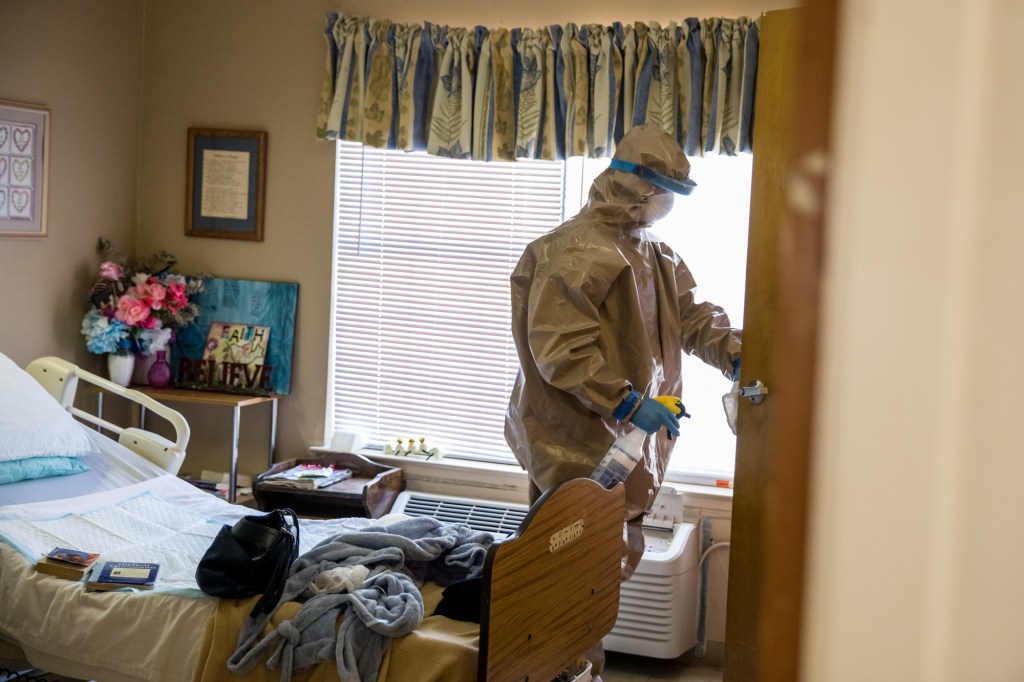Senate panel guts patient visitation bill
Published 12:00 pm Thursday, March 25, 2021

- A Georgia National Guardsman cleans a resident's room at the Condor Health Lafayette nursing home in Fayetteville.
ATLANTA — After stark opposition from medical providers, Senate lawmakers gutted a bill that would have prohibited hospitals and nursing homes from banning visitors during public health emergencies.
Possibly the most controversial bill being debated this session — behind wide-sweeping elections changes — proponents argued that no health emergency or executive order could revoke the rights of a patient to see a family member while opponents decried the impact visitors could have on hospital infection-control efforts.
The version that passed out of the House allowed a “legal representative” — an individual who is designated to help make medical decisions — at least one hour of visitation a day to patients in acute care settings. In long-term care settings, more flexibility for caregivers is allowed.
After the pandemic shuttered hospitals and nursing homes to visitors many Georgians felt the emotional toll of the strict infection control efforts that kept families apart for months.
The bill’s sponsor, Rep. Ed Setzler, argued the bill does not give free-for-all visitation rights but makes sure patients have access to a familiar face to help make “life-changing medical decisions.”
“What this bill does is, after 12 hours,” Setzler said Wednesday, “it gives the patient the right to say, you know what I want to have a person standing next to me to make the life-changing decisions that I’m facing isolated here all by myself.”
But the Senate panel voted to gut the bill, essentially squashing the effort.
Bainbridge Republican Sen. Dean Burke raised concern that there was not enough time left in the session for lawmakers to perfect this bill as needed.
“Our health care system has just gone through a shock like it’s never been through in my 63 years and I would say it’s probably much longer than that,” he said. “I’m just extremely concerned that this bill needs more work.”
Burke sponsored an amendment that directs medical providers to craft visitation guidelines that are no stricter than ones already outlined by the Centers for Medicare & Medicaid Services and directs the Georgia Department of Community Health to create a system for patients and visitors to report facilities that institute overly strict policies.
Cumming Republican Sen. Greg Dolezal objected to the change and cautioned lawmakers about saving this issue for a future date.
“I would hate to see this bill gutted,” he said. “Because if I’ve heard from anything from my constituents — other than all the noise we’ve heard around the elections — I would have to say this particular issue has been the one that I’ve heard the most from, from my constituents.”
Medical providers have fervently fought against the bill, saying that under extreme circumstances such as the COVID-19 pandemic, decisions like closing hospitals to visitors are made to protect staff and other vulnerable patients.
Deb Bailey, director of government affairs with the Northeast Georgia Medical Center, recalled when Hall County had a 35% COVID-19 positivity rate — making it among the counties with the highest rates of the virus in the country.
Bailey said at the time, 350 patients in the 750-bed hospital were COVID-19 positive. The facility was overwhelmed, she said, and had coronavirus patients in their emergency department, psychiatric department and in a gym on cots.
“We ended up with 1,000 of our staff being positive for COVID, and we lost several of them,” she said. “We’re asking today, that you allow our infectious disease physicians, and those that are responsible for the care of our patients and our staff, the ability to make that decision, when that is necessary on when patients are allowed to visit.”
But lawmakers also faced heart-wrenching testimony from Georgians who have been kept from their loved ones. Lori Ciminelli told lawmakers that her mother, who has been in a long-term care facility for two years, suffered “failure to thrive” during COVID when Ciminelli couldn’t visit her and deteriorated in health.
“She didn’t care anymore. And she didn’t understand where I was,” she said. “The dementia is accelerated because of this.”




